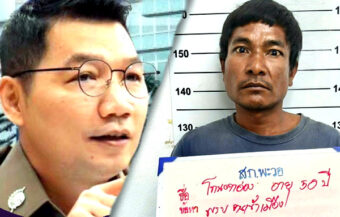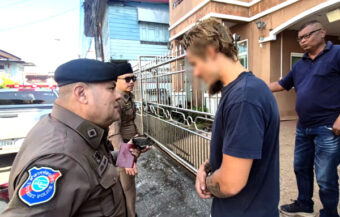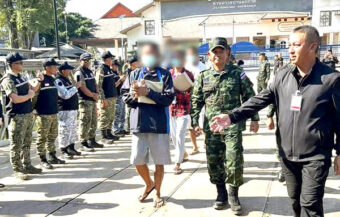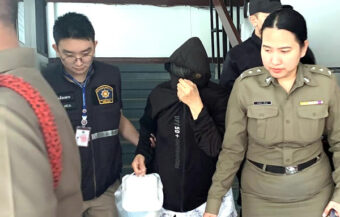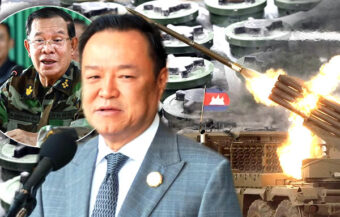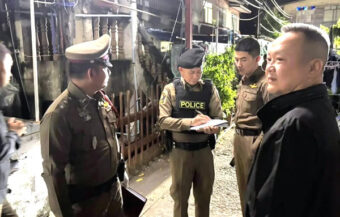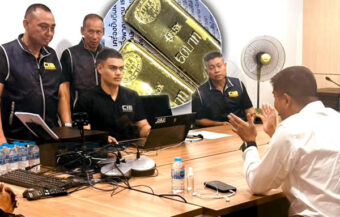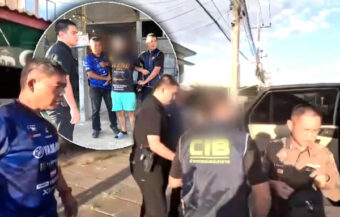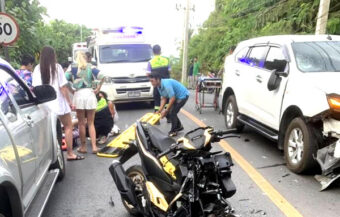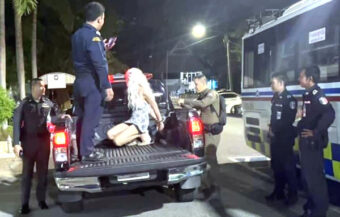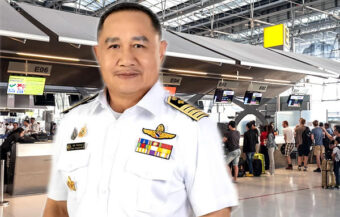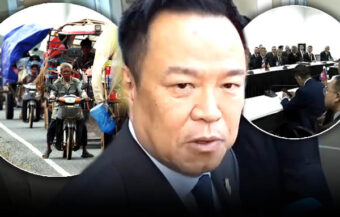Thailand escalates its hardline border stance as Cambodian families in Ban Nong Ya Kaeo and Ban Nong Chan in Sa Kaeo Province face forced removal. The army demands detailed evacuation plans from Cambodia by October 7. Tensions set to rise sharply with upcoming talks in doubt.
Border tensions between Thailand and Cambodia are set to flare after a Friday ultimatum from a senior Thai Army commander to his Cambodian counterpart. The letter warns that Regional Border Committee (RBC) meetings could be cancelled if Cambodia does not remove families from Ban Nong Ya Kaeo and Ban Nong Chan in Sa Kaeo Province, undisputed Thai territory. Thailand’s tough stance signals a determination to eliminate any ambiguity over its borders. Meanwhile, the military has been strengthened by the Anutin government and boosted with additional funding to tighten security, including the completion of a permanent border fence between the two nations.
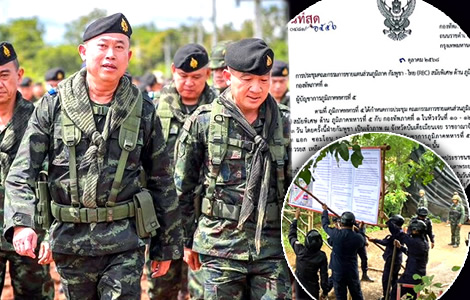
Following a cabinet meeting this week and a National Security Council session, Prime Minister Anutin Charnvirakul suggested the October 10 deadline for Cambodian families in Ban Nong Ya Kaeo and Ban Nong Chan, Sa Kaeo province, may not be upheld. He emphasised a more humane approach and indicated that the families might not be forcibly removed by the set date. Consequently, questions arose about how authorities plan to balance security concerns with humanitarian considerations.
On Sunday, September 28, forestry officials, accompanied by Thai soldiers, erected large notices in Cambodian, Thai, and English. These notices ordered the small communities to vacate Thai land immediately.
The families are reported to have lived in the area for decades, yet the land itself is not part of any officially disputed territory. Therefore, the current removal orders represent a sharp shift from long-standing informal practices.
Prime Minister signalled a delay to evacuation deadline, referring to security and humane tactics
Historically, these communities existed due to a spirit of understanding between Thailand and Cambodia. This tacit agreement allowed Cambodian families to live undisturbed within certain Thai border zones.
However, the understanding effectively ended after a border conflict erupted this summer. From July 24 to July 28, 2025, both sides engaged in full-scale hostilities. The clashes resulted in deaths on both sides, including 16 Thai soldiers. Moreover, civilian casualties were reported, highlighting the human cost of the confrontation.
Despite the previous informal understanding, the Royal Thai Army has now taken direct responsibility for removing Cambodian families. On Friday, the Commander of Army Area 1 sent an urgent letter to his Cambodian counterpart.
The letter demanded that Cambodia remove its nationals from the three areas between October 10 and October 12. Consequently, the army imposed a strict timeline for evacuation.
Royal Thai Army assumes control and issues strict orders for Cambodia to remove families by mid-October
In addition, the First Army Region has urged Cambodia to submit evacuation plans for villagers by October 7. They warned that failure to comply could result in Thailand refusing to participate in the upcoming Regional Border Committee (RBC) meeting. Furthermore, the urgency of the order reflects the heightened sensitivity of border management after recent clashes.
On October 3, 2025, reporters confirmed that the Commander of Army Area 1 sent a formal document to the Commander of Military Region 5 of Cambodia. The document specified that the RBC meeting would occur from October 10 to October 12.
The meeting will last two days and involve joint discussions on border management and civilian relocation. Moreover, Cambodia will host the forum in Banteay Meanchey Province, Kingdom of Cambodia.
Lt. Gen. Aek Som-on, Deputy Commander-in-Chief of the Royal Thai Army and Commander of Military Region 5, and Lt. Gen. Worayot Leungsuwan, Commander of Army Area 1, are invited to chair the joint session. The leadership underscores the high-level attention the border issues have received. Therefore, the meeting is expected to set important precedents for bilateral cooperation.
Cambodia to host two-day RBC meeting with Thai generals to discuss border security and relocation plans
The First Army Region has requested that Cambodia prepare an evacuation plan for citizens in Ban Nong Chan, Ban Nong Ya Kaeo, Khok Sung District, and Ban Ta Phraya, Ta Phraya District, Sa Kaeo Province. In total, three Thai border areas are affected.
Consequently, Cambodian authorities must provide a detailed plan for safely relocating residents before the RBC meeting. The plan must also address timelines, transportation, and security arrangements to prevent chaos or further clashes.
The evacuation plan must be submitted to the 1st Army Area by October 7, 2025, and presented during the RBC meeting. Only then will Thailand’s delegation participate in the forum. Lt. Col. Sarayut Chanprayong, Assistant Operations Officer, 1st Army Area, has been assigned as the coordinator. Furthermore, the process is officially signed and authorised by Lt. Gen. Worayot Leungsuwan, 1st Army Area Commander.
Observers note the removal order has created widespread tension. Families living in Ban Nong Ya Kaeo and Ban Nong Chan have expressed fear and anxiety. Many have lived in these communities for generations and rely on local agriculture for survival. Moreover, the relocation threatens access to schools, healthcare, and traditional livelihoods. As a result, residents face potential disruption to every aspect of daily life.
Removal orders create tension and uncertainty for families living for decades in safe border communities
Experts in Thai-Cambodian relations emphasise the challenge of balancing security and humanitarian needs. The areas in question are not officially disputed, yet the army’s enforcement actions reflect a new hardline approach.
Consequently, residents may experience forced displacement without prior international oversight. Analysts warn that such measures could strain diplomatic relations if not managed carefully.
Military sources confirmed the Royal Thai Army’s involvement shows the government prioritises security. The requirement for an evacuation plan ahead of the RBC meeting aims to prevent misunderstandings and further violence.
Furthermore, the RBC has historically served as a forum for resolving disputes, coordinating border security, and protecting civilians. The upcoming meeting will likely test both nations’ ability to manage sensitive issues collaboratively.
Experts warn military’s stance risks diplomatic fallout while testing Thai and Cambodian cooperation norms
Lt. Gen. Worayot Leungsuwan’s directive emphasises the urgency of compliance. Cambodia must act promptly to submit the evacuation plan. Failure to do so may prevent participation in the RBC meeting, undermining regional cooperation.
Additionally, coordination with Lt. Col. Sarayut Chanprayong is intended to ensure accountability, efficiency, and clear communication regarding the relocation process.
Prime Minister Anutin’s comments suggest the Thai government may consider adjusting timelines for humanitarian reasons. A more flexible approach could involve extending the removal deadline or providing logistical support to affected families. Nevertheless, no official adjustment has been confirmed. Cambodian authorities remain under pressure to meet the October 7 submission deadline.
The situation has drawn attention from international observers. The potential displacement of civilians from areas not officially under dispute raises concerns about human rights, border policy, and regional stability. Consequently, transparency and careful planning will be critical to prevent renewed tensions. Analysts also stress that mishandling the relocation could create long-term diplomatic friction.
Prime Minister and international observers watch closely as Thailand presses urgent evacuation compliance
Meanwhile, local residents continue their daily routines despite uncertainty. Farmers tend crops, children attend school, and families attempt to plan for potential relocation. However, anxiety is widespread, and the looming eviction affects everyday life. Some households have already begun packing belongings in anticipation of official orders. Others are waiting for precise instructions from Cambodian or Thai authorities.
The Royal Thai Army’s involvement indicates the government prioritises security concerns. Military and civil authorities are coordinating to ensure that the RBC meeting addresses both security and humanitarian issues.
Moreover, the forum aims to provide a structured framework for orderly relocation and bilateral communication.
Residents cope with daily life amid looming eviction as army and officials try to negotiate their relocation
As the October 7 deadline approaches, both sides face a delicate balance between law enforcement and civilian welfare. Submission of an evacuation plan, coupled with RBC preparations, will determine the immediate next steps.
Therefore, the outcome will likely influence future border management policies. Analysts note that how authorities handle this sensitive issue could determine how the next chapter in this Thai-Cambodian standoff since May 2025 unfolds.
Undoubtedly, so far it has been a rocky ride with scores of deaths and a Thai government overthrown. This new hardline policy could certainly provoke an escalation from the current simmering tensions that have seen Cambodia backfooted both diplomatically and militarily.
PM confirms government’s referendum plan to scrap MOUs with Cambodia. Top People’s Party MP shocked
Thailand gives Cambodian squatters days to leave Thai soil or face prosecution and up to 15 years jail
China denies any interest in the Thai-Cambodian conflict after it was revealed that Chinese arms were used
In summary, the situation in Sa Kaeo province reflects a sharp break from historical understanding, military enforcement, and previous humanitarian concerns. A new and potentially colder Thai-Cambodian era is dawning, with the potential at all times for a return of heated conflict.
Join the Thai News forum, follow Thai Examiner on Facebook here
Receive all our stories as they come out on Telegram here
Follow Thai Examiner here
Further reading:
PM confirms government’s referendum plan to scrap MOUs with Cambodia. Top People’s Party MP shocked
Leader of deadly scam gang in Cambodia and henchmen still at large with 4 more Thais arrested
Police in Cambodia close in on fake scam loan app leadership after family murders in Samut Prakan
Cambodian cybercrime industry run by Chinese criminals could be generating up to 38% of its GDP
Debt and ฿1.7 million loss to scammers drive man to murder his wife and two sons in Samut Prakan
Loan shark arrested in Nonthaburi for bullying a borrower charged an annual interest rate of 730%
Bank of Thailand to tackle household debt in new plan from 2024 which will see higher standards
Politicians skating on thin ice as the economy may not be able to withstand a political stalemate
Debt crisis may be one of the top items on the new cabinet’s agenda as central bank stands ready
Potential hazard lights flashing as kingdom’s auto loans spiral into default with sky-high borrowing
Bank of Thailand governor gives veiled warning to voters on the danger posed by populist policies


